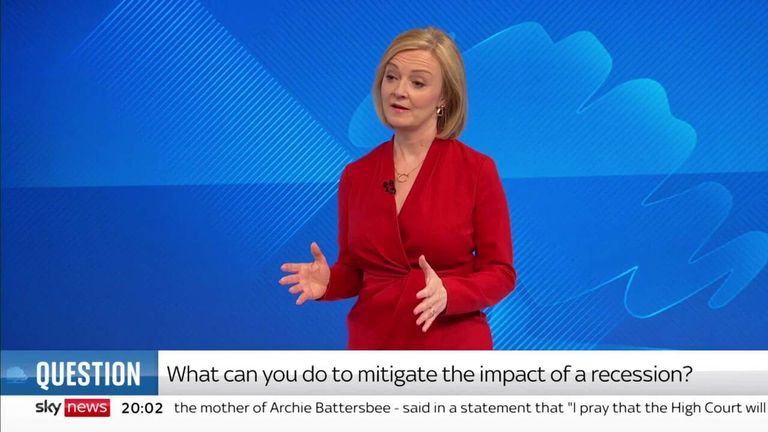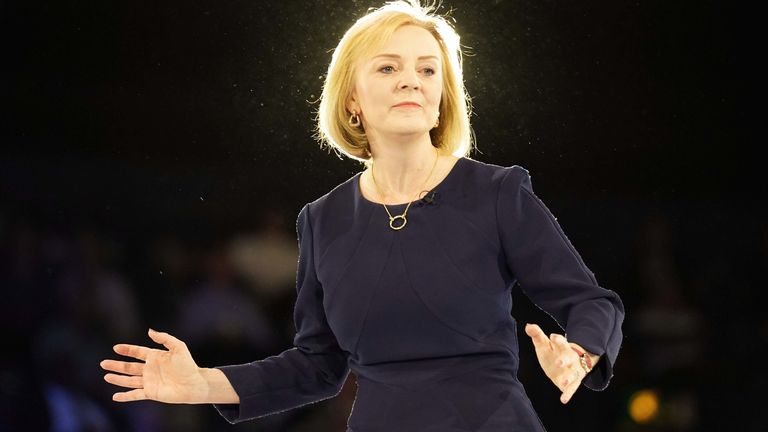[ad_1]
Tackling the price of residing disaster, Liz Truss herself has stated, is her primary precedence as soon as she will get the keys to Quantity 10.
Her victory over Rishi Sunak within the Tory management race adopted a tense five-week debate, dominated by how every would strategy getting payments down for households and companies.
After criticism that the federal government was rudderless within the face of hovering inflation and warnings of a recession forward, Ms Truss promised on Sunday she would reveal her vitality invoice motion plan inside per week.
Right here Sky Information examines what which will entail, the broader measures which can be anticipated to comply with and the price of all that assist to the general public funds.
The massive image
Recession is “not inevitable”.
It was a comment from Ms Truss firstly of her push for prime minister that stood out from the early crowd of hopefuls.
With the annual fee of inflation working at greater than 10%, client spending, the principle engine of the UK economic system, is slowing down whereas a rising variety of companies fear their prices will pressure them out of enterprise.
The one largest driver of inflation within the UK (and elsewhere in Europe) is the soaring cost of raw energy resulting from Russia’s struggle in Ukraine.
That is the place Ms Truss will place her preliminary focus.
Vitality payments
It was introduced final week that the energy price cap, which covers the overwhelming majority of households, would rise to a median annual complete of £3,549 from October and there may be hypothesis that sum may exceed £5,000 subsequent yr.
Companies, which aren’t coated by the worth cap, have needed to swallow rising fuel and electrical energy prices a lot earlier.
It has meant these further payments have been handed on down the provision chain, fuelling the inflation drawback additional, but additionally elevating fears that unsustainable costs will finally pressure companies out of enterprise and unemployment up.
Ms Truss has been tight-lipped on the small print of her plan to assist deliver down vitality payments however hypothesis is rising that it’ll come within the type of an vitality value freeze.
She has promised extra support past the £37bn of value of residing assist introduced by the federal government up to now that sees the poorest households safe as much as £1,200, with grants of £400 for all houses.
The help might come within the type of extra grants however there are rising experiences that the Treasury will fund a value cap freeze.
The Occasions has said that the size of the assist may very well be on a par with the £70bn COVID furlough scheme.
A senior Truss ally has advised Sky Information a “shock and awe” announcement could be anticipated; signalling a much bigger bundle than folks presently count on – giving extra weight to the prospect of a invoice freeze.
Keep in mind: Labour’s plan for a invoice freeze was criticised by the Truss camp.
For companies, there was speak of a reduce in enterprise charges to assist with vitality prices, however Ms Truss has talked about no particular particulars bar ruling out additional windfall taxes on the large oil companies.
Along with tackling the fast drawback of rising payments, her vitality plan due this week can be anticipated to comprise data on how the UK will bolster its vitality safety.
Spending cuts?
Ms Truss has explicitly dominated out slicing public spending to save cash.
Tax cuts
We’re unlikely to get any particulars of the Truss plans to stimulate the economic system till a Funds later within the autumn however she has promised a “daring” plan to chop taxes and bolster development.
Her concept of slicing taxes to stimulate spending was most likely essentially the most divisive situation of the management race.
Mr Sunak, the previous chancellor, argued that damaging tax receipts earlier than inflation was below management would show “regressive” and solely bolster inflation additional.
However Ms Truss has been contemplating a cut in VAT to fifteen% to assist each customers and companies, in keeping with a Sky Information supply, in a transfer that might harm revenues by £38bn yearly, in keeping with the IFS think-tank.
She may additionally transfer to increase the reduce in gasoline responsibility resulting from finish in March.
Ms Truss’s group can be contemplating lifting the non-public tax-free allowance, in keeping with The Sunday Occasions, elevating the purpose at which individuals pay the 40% fee of tax and slicing the essential tax fee beneath 20%.
One attainable measure – that would seem extra nailed-on due to a marketing campaign pledge – is the reversal of the current rise in Nationwide Insurance coverage to assist fund social care and NHS backlogs.
Such a transfer would profit the very best earners extra and is seen by critics as intensifying earnings inequality.
Ms Truss can be extensively anticipated to cancel one other Sunak-era measure – a deliberate hike in company tax from 19% to 25% subsequent April – over fears it is going to harm the UK’s post-Brexit competitiveness.
What value to the general public funds?
None of those measures are set in stone, however it’s clear that in the event that they had been all taken, the short-term value to the general public funds may high £100bn simply however it’s a purely speculative determine.
It’s based mostly on the idea that vitality payments are frozen this winter, VAT is reduce, the company tax hike is cancelled and enterprise charges are reduce.
With the UK nationwide debt nearing £2.4trn, can the federal government afford to take these measures after the unprecedented assist supplied in the course of the pandemic, given the hovering value of servicing that debt?
Given the size of the costs being confronted by households and companies, all sides agree it will be irresponsible to not provide assist. The controversy centres on who ought to profit.
[ad_2]
Source link



